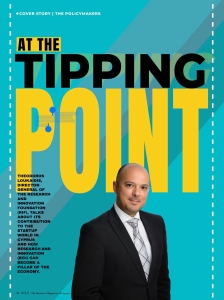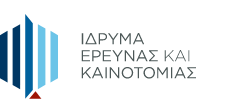“At the Tipping Point”, Cover Story Interview of Theodoros Loukaidis, Director General of RIF *GOLD Magazine, Issue 145, April 2023, Cyprus: The Next Startup Nation?
- What role can startups play in setting the economy on a growth trajectory?
Startups bring new products and services to the market. Their risk appetite often helps push boundaries and in doing so they drive productivity and create new jobs in high-growth areas. Therefore, they contribute significantly to driving economic growth, positively impacting all sectors of the economy and beyond.
- Since 2016, the Research and Innovation Foundation (RIF) has awarded €145 million in grant schemes to fund Research & Innovation (R&I) in the country. How have these funds helped local startups grow?
RIF provides a wide range of R&I funding programs and high-quality services targeting startups and innovative companies. You are correct: RIF has allocated more than €145 million to the R&I ecosystem through the RESTART Programmes, resulting in the creation of 1.455 new jobs, and increasing the turnover of the participating companies. Moreover, since 2019, RIF allocated more than €30 million to 104 innovative enterprises – 64 of which were startups – for the creation and development of innovative products and services with significant potential to penetrate the international market. This resulted in the creation of 250 new jobs and private co-funding of over €15 million as well as private investments from the EU, US and elsewhere, providing high-risk capital for new technologies.
Beyond the direct impact on the country’s economy, RIF’s Innovation Programmes serve as a springboard for Cypriot startups and innovative SMEs, enabling them to compete effectively on an EU level, and secure funding from the European Innovation Council. For 2021 – 2027, RIF launched its new framework of programmes with a €150m budget for targeted investments. Among our main goals are the creation of a highly competitive fit-for-the-future ecosystem, strengthening an outward-looking culture and facilitating internationalization.
- Give us a brief description of the RIF schemes available for startups.
With a view to further help local startups grow, in the framework of our 2021-2027 programmes, we will be announcing one Call per year for PRE-SEED funding. Through these Calls, we will support the creation and initial growth of startups that aim to develop innovative products and services with the prospect of entering the international market. We also have upcoming Calls for SEED funding, more information on which can be found on the calendar of Calls published on our website. In addition, startups can also submit proposals for RIF’s flagship DISRUPT Programme, which aims to connect enterprises that demonstrate cutting-edge innovation and the potential to create new or disrupt existing markets, with venture capital firms that will support their further development and scaling-up in international markets. At the proposal submission stage, entities must have a signed binding agreement with an investment fund regulated by a competent authority in Cyprus or another EEA member state. The agreement should foresee an equity capital investment of at least €1 million in the company, to support its development in international markets. The maximum funding per project is €1.5 million and the first cut-off date is 1 June 2023.
In addition to these schemes, RIF provides a comprehensive portfolio of knowledge transfer and innovation services. These include targeted activities for capacity building in knowledge transfer and the commercial exploitation of research results, as well as training programmes to develop and further enhance entrepreneurial and commercial skills. These services are available to startups and, indeed, the entire national R&I ecosystem, free of charge.
- How long does it take to go through the process for securing funding from beginning to end?
RIF’s operational efficiency has improved significantly in recent past years. Since 2019, we have managed to reduce the average time between submitting a proposal and signing a contract from 21 months to eight. Upon signing their contract, entities receive a pre-financing payment. Thereafter, during project implementation, the average time for payment is now just 69 days. There is always room for improvement, but given these numbers, I am confident that we can do even better for the benefit of our R&I ecosystem.
- In your opinion, how can we turn the Cypriot R&I ecosystem into a major contributor to the country’s GDP?
If we had been discussing this 10 years ago, we would have had very little to talk about. Today, as a consequence of the significant investments made by the state and spearheaded by RIF, we can note significant progress, reflected recently in the European Innovation Scoreboard 2022. For example, our country’s performance in terms of linkages is 128% above average, while sales impacts, reflecting the growing number of knowledge-intensive services and high-tech goods exports as well as sales of innovative products, is 11.4% above average.
We have come a long way; Cyprus is at a tipping point and it is now time to make the most of the investments that the Cyprus Government has made and turn our excellent science into products, services and processes that make it in international markets. In doing so, we can transform our national economy, allowing the ecosystem to become a major contributor to the country’s GDP.

